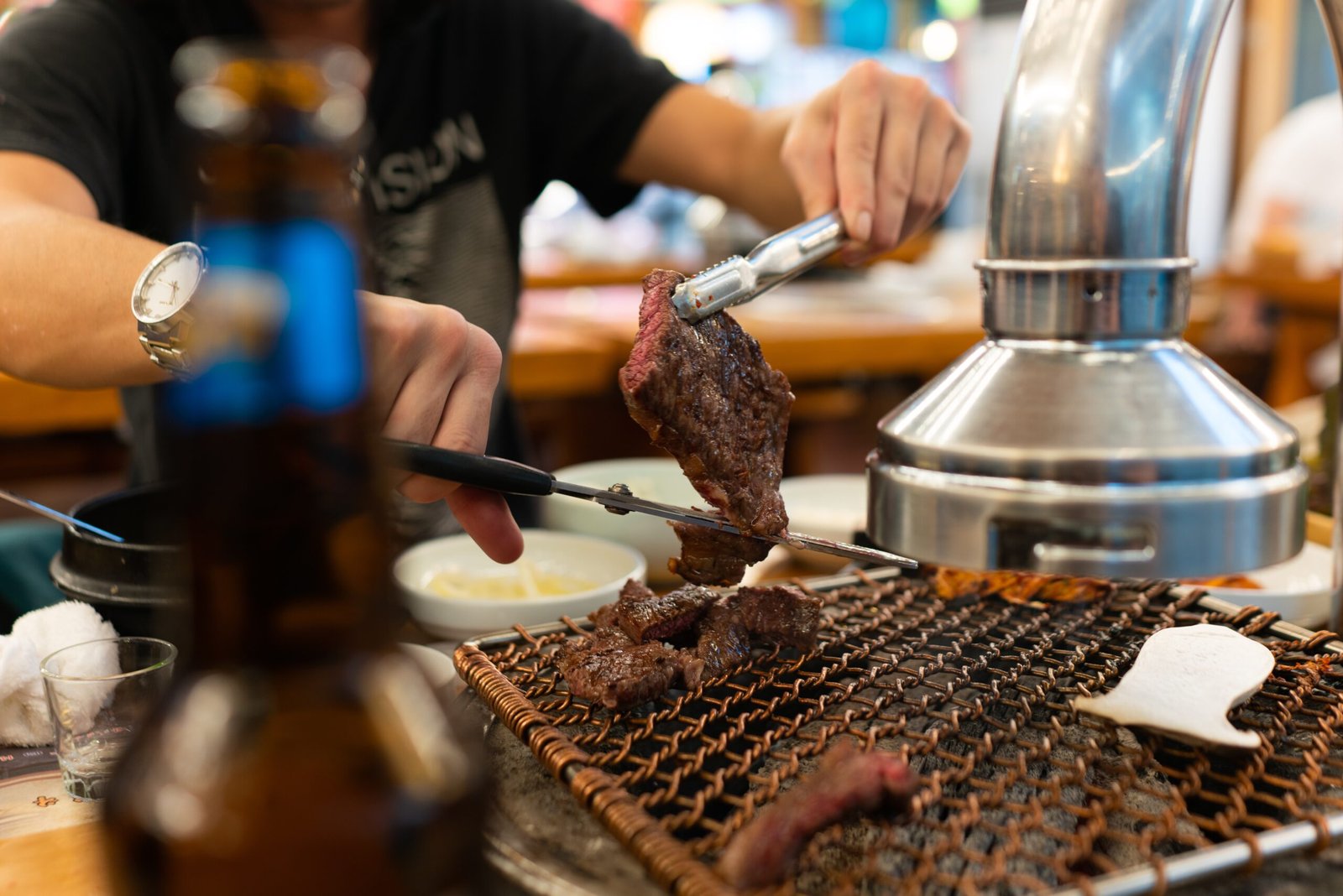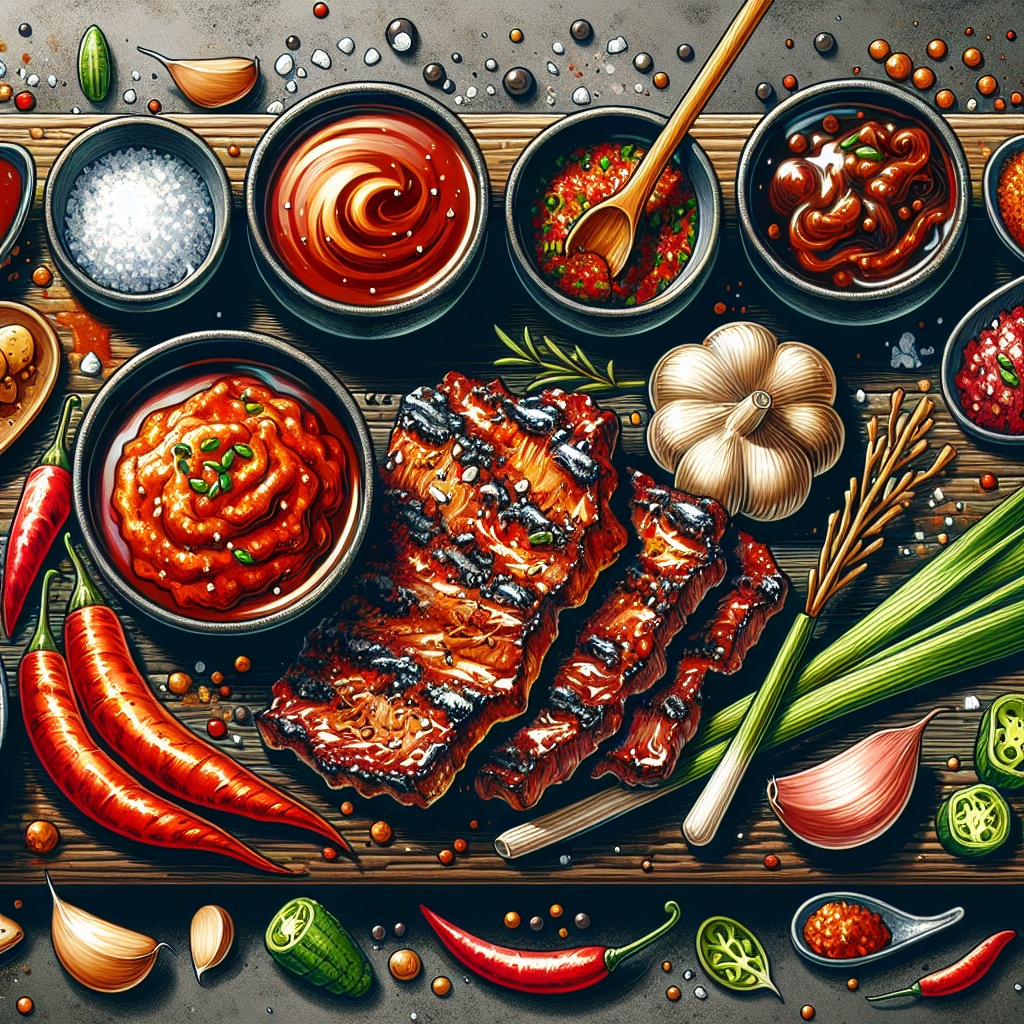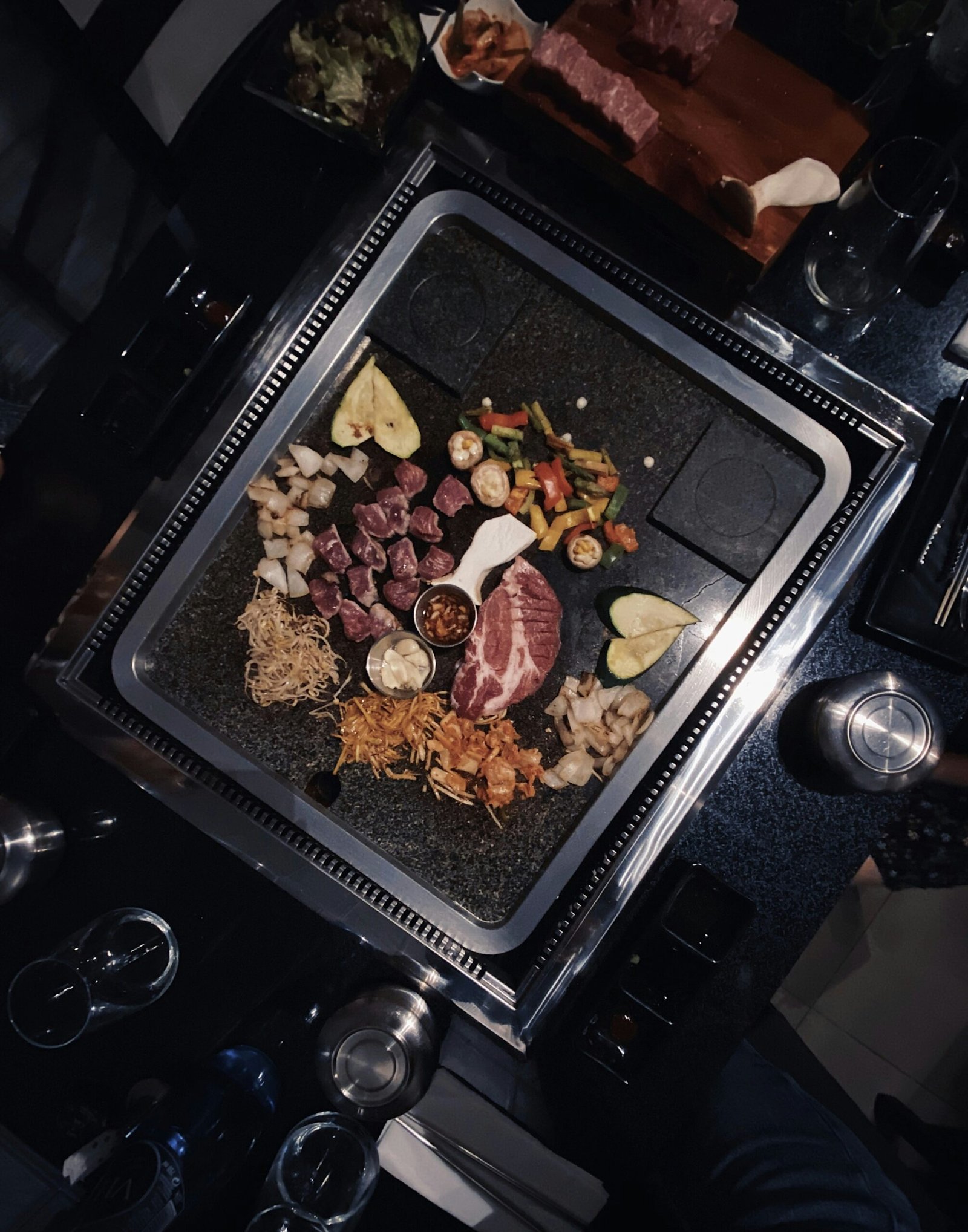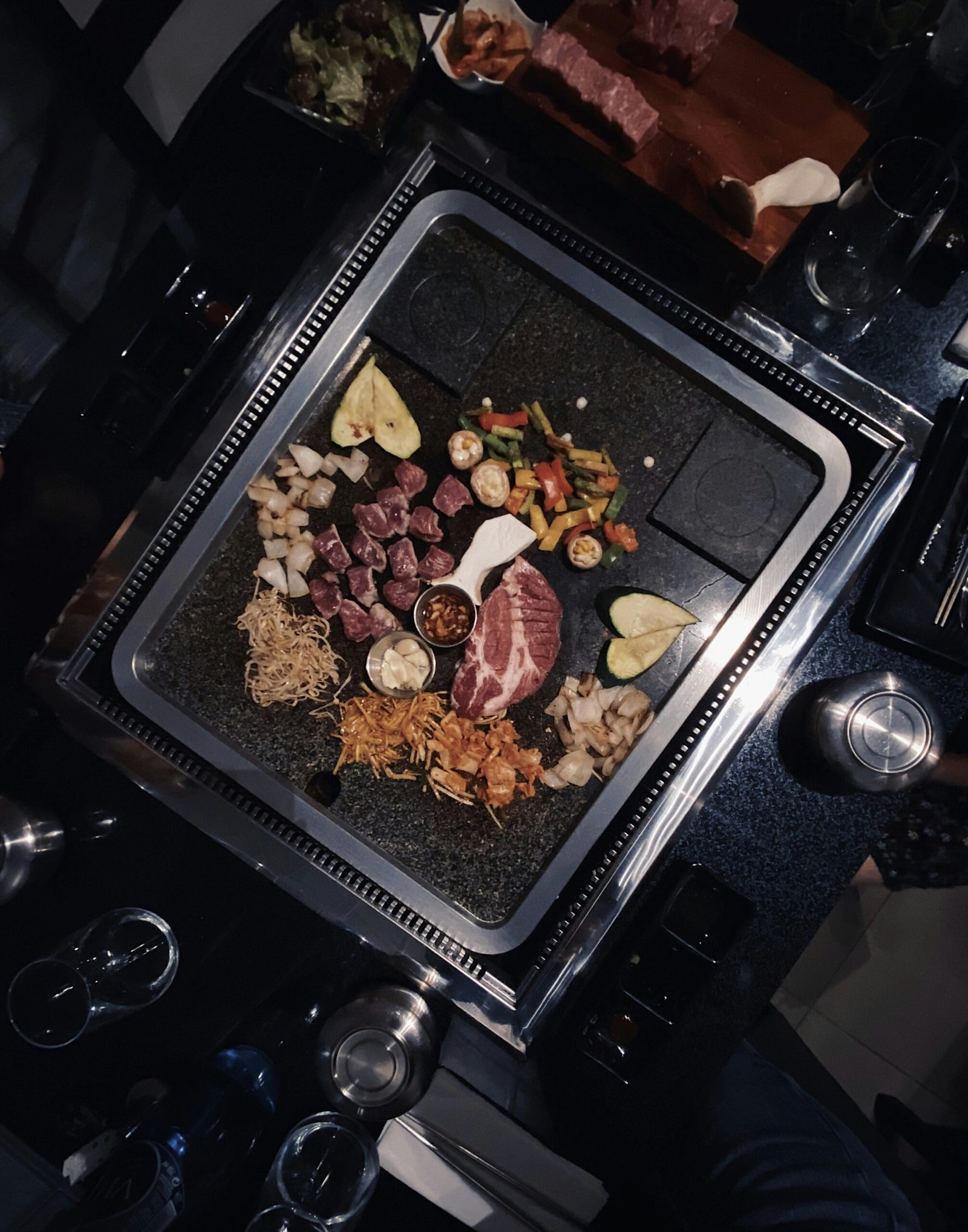If you’re a barbecue enthusiast always on the lookout for new and exciting flavors, then you’re in for a treat. Korean cuisine has been making waves in the culinary world, and its influence on barbecue sauces and glazes is no exception. From the fiery heat of gochujang to the sweet and tangy flavors of doenjang, Korean flavors are adding a delicious twist to traditional barbecue. In this article, we’ll explore the latest trends in incorporating Korean flavors into your favorite barbecue sauces and glazes, so get ready to tantalize your taste buds with an explosion of flavor.

Introduction
Barbecue is a beloved culinary tradition that brings people together to enjoy smoky, flavorful dishes. And when it comes to barbecue flavors, Korean cuisine has been making waves in recent years. The unique blend of sweet, savory, and spicy flavors found in Korean cuisine has inspired chefs around the world to incorporate these delicious tastes into their barbecue sauces and glazes. In this comprehensive article, we will explore the latest trends in using Korean flavors in barbecue sauces and glazes, ranging from traditional flavors to fusion creations and even vegetarian options. So get ready to tantalize your taste buds and learn about the exciting world of Korean-inspired barbecue!
1. Traditional Korean Barbecue Flavors
1.1 Gochujang
Gochujang is a staple ingredient in Korean cuisine and is a spicy red chili paste made from fermented soybeans, red chili peppers, glutinous rice, and salt. Its rich, umami flavor and fiery kick make it a popular choice for marinades and sauces. When used in barbecue sauces, gochujang adds a depth of flavor and a hint of heat that pairs perfectly with grilled meats.
1.2 Soy Sauce
Soy sauce is a classic ingredient in Korean cooking, providing a savory, salty flavor that enhances the taste of grilled meats. Its unique umami taste adds depth and richness to barbecue sauces, making it a versatile choice for both traditional and fusion recipes.
1.3 Sesame Oil
Known for its nutty flavor, sesame oil is commonly used in Korean cuisine to add a distinct aroma and taste to dishes. When incorporated into barbecue sauces and glazes, sesame oil imparts a subtle, earthy flavor that complements the smoky notes of grilled meats.
1.4 Garlic
Garlic is a flavor powerhouse in Korean cooking, and its pungent, aromatic taste adds depth and complexity to barbecue sauces. Whether used fresh or roasted, garlic brings a bold, savory profile to the table, enhancing the overall flavor of grilled meats.
1.5 Ginger
Ginger is a fragrant and versatile ingredient in Korean cuisine, used for its refreshing and slightly spicy taste. Its zesty flavor adds a lively kick to barbecue sauces and glazes, balancing out the sweetness and enhancing the overall flavor profile.

2. Fusion of Korean and Western Flavors
2.1 Kimchi BBQ Sauce
Kimchi, a traditional Korean fermented side dish, has gained popularity worldwide for its unique, tangy flavor. The spicy, sour taste of kimchi makes it an excellent base for barbecue sauces, adding a punch of umami and heat to grilled meats. Kimchi BBQ sauce offers a fusion of Korean and Western flavors, bringing together the best of both worlds.
2.2 Bulgogi Glaze
Bulgogi, a Korean barbecue classic, is known for its sweet and savory marinade. Inspired by this beloved dish, Bulgogi glaze adds a caramelized richness to grilled meats. With a combination of soy sauce, sugar, garlic, and sesame oil, this glaze creates a flavor explosion that will have you coming back for seconds.
2.3 Spicy Korean Barbecue
For those who enjoy a fiery kick, spicy Korean barbecue sauces are a must-try. Infused with Korean chili pepper flakes, these sauces bring the heat while still offering a balance of flavors. The spiciness of the chili pepper is tempered by the sweetness of other ingredients, creating an addictive sauce that will keep you reaching for more.
2.4 Honey Garlic Gochujang
Combining the sweetness of honey, the boldness of garlic, and the spiciness of gochujang, this fusion sauce is a winning combination. The honey adds a touch of sweetness to balance the heat of the gochujang, while the garlic adds depth and aroma. This versatile sauce can be used as a marinade or glaze, adding a burst of flavor to grilled meats.
3. Vegetarian and Vegan Options
3.1 Tofu Barbecue Sauces
For those following a vegetarian or vegan diet, tofu barbecue sauces are a fantastic option. Tofu, with its neutral flavor and ability to absorb other tastes, makes an excellent base for barbecue sauces. By incorporating Korean flavors such as soy sauce, ginger, and garlic, tofu barbecue sauces can achieve a robust and savory taste that even non-vegetarians will enjoy.
3.2 Mushroom-based Glazes
Mushrooms are another great alternative for vegetarian and vegan barbecue options. With their meaty texture and umami flavor, mushrooms can mimic the taste and texture of grilled meats. By creating mushroom-based glazes infused with Korean spices and seasonings, you can elevate your vegetarian barbecue experience to a whole new level.
3.3 Vegetable Marinades
Don’t forget about the power of marinating vegetables! Grilled vegetables can be just as delicious and flavorful as meats when prepared with a tasty marinade. By combining Korean-inspired ingredients such as soy sauce, sesame oil, and gochujang, you can create marinades that will transform ordinary vegetables into succulent, smoky delights.

4. Use of Fruit Infusions
4.1 Pineapple BBQ Sauce
Fruit-infused barbecue sauces are gaining popularity as a way to add a sweet and tangy twist to grilled meats. Pineapple BBQ sauce, for example, combines the natural sweetness of pineapple with the smoky flavors of barbecue. The acidity of the pineapple helps to tenderize the meat while adding a tropical flair to your barbecue experience.
4.2 Mango Gochujang Glaze
Mango is another fruit that pairs beautifully with Korean flavors, particularly gochujang. The sweetness and juiciness of mango provide a refreshing contrast to the spicy and savory taste of gochujang. When transformed into a glaze, this combination creates a delightful balance of flavors that will elevate your barbecue to new heights.
4.3 Citrus Marinades
Citrus fruits, such as orange, lime, and lemon, are not only refreshing but also add bright, tangy flavors to barbecue sauces and marinades. By incorporating Korean spices and seasonings, such as garlic, ginger, and soy sauce, into citrus marinades, you can create zesty and vibrant flavors that will enhance the taste of grilled meats.
5. Incorporation of Heat
5.1 Spicy Korean Chili Paste
Korean cuisine is known for its love of spice, and incorporating spicy elements into barbecue sauces and glazes is a popular trend. Spicy Korean chili paste, or gochujang, adds a fiery kick to any marinade or glaze. Its complex flavors and heat levels can be adjusted to suit your personal taste, making it a versatile ingredient for those who enjoy a bit of heat.
5.2 Hot Pepper Infused Sauces
If you’re a heat seeker looking to crank up the spiciness of your barbecue, hot pepper-infused sauces are the way to go. From habanero to ghost peppers, there are endless options for incorporating intense heat into your barbecue sauces. By combining these hot peppers with Korean flavors, you can create sauces that are not only spicy but also bursting with delicious flavors.
5.3 Sriracha Barbecue Glaze
Sriracha, a popular Asian hot sauce, has found its way into countless recipes, including barbecue sauces and glazes. Its tangy, garlicky taste and moderate heat level make it a favorite among spice enthusiasts. When combined with Korean flavors, sriracha creates a unique fusion of tastes that will add a fiery kick to your grilled meats.

6. Experimentation with Sweet and Savory Combinations
6.1 Garlic-Sesame Brown Sugar BBQ Sauce
For those who love the contrast of sweet and savory flavors, garlic-sesame brown sugar barbecue sauce is a must-try. This delectable combination of ingredients creates a rich and caramelized sauce that enhances the natural sweetness of grilled meats. The nuttiness of sesame oil, the sweet complexity of brown sugar, and the savory punch of garlic come together to create a sauce that will have your taste buds dancing.
6.2 Honey-Soy Glaze with Korean Chili Flakes
Honey and soy sauce are a tried and true combination in Korean cuisine, bringing together the natural sweetness of honey with the umami flavor of soy sauce. By adding a sprinkle of Korean chili flakes, you can introduce a touch of heat to this already delicious glaze. This sweet and savory glaze is perfect for basting grilled meats, creating a glossy and flavorful finish.
6.3 Teriyaki-Gochujang Marinade
Teriyaki sauce is a popular choice for marinades, known for its sweet and tangy flavors. By adding gochujang to the mix, you can take your teriyaki marinade to the next level. The spicy kick of gochujang complements the sweetness of teriyaki, creating a well-balanced marinade that will infuse your meats with mouthwatering flavors.
7. Infusion of Smoky Flavors
7.1 Smoked Paprika Barbecue Sauce
Smoked paprika is a versatile ingredient that can add a smoky and earthy flavor to barbecue sauces and glazes. When combined with Korean flavors, such as soy sauce and sesame oil, smoked paprika creates a mesmerizing fusion of tastes. The smokiness of paprika adds depth and complexity to your barbecue, making it a standout dish.
7.2 Liquid Smoke-infused Glazes
Liquid smoke is a popular ingredient used to give a smoky flavor to dishes without actually smoking them. It can be easily incorporated into barbecue glazes, adding a subtle, yet distinct smokiness to grilled meats. When combined with Korean spices and seasonings, liquid smoke-infused glazes provide a tantalizing flavor experience that transports you to a smoky barbecue paradise.
7.3 Hickory-smoked Korean Marinades
For those who crave the authentic taste of smoked barbecue, hickory-smoked Korean marinades are a game-changer. By marinating your meats in a mix of Korean flavors and hickory smoke, you can achieve that mouthwatering, smoky taste that is characteristic of traditional barbecue. The combination of bold Korean spices and the rich smokiness of hickory creates a marriage of flavors that will leave you craving more.

8. Healthy and Nutritious Ingredients
8.1 Black Sesame Seed BBQ Sauce
Black sesame seeds are not only visually appealing but also packed with nutritional benefits. When ground into a paste or incorporated into sauces, they add a nutty and slightly sweet taste to dishes. Black sesame seed barbecue sauce brings a unique twist to traditional flavors, providing a rich and aromatic sauce that is both healthy and delicious.
8.2 Fermented Barbecue Glazes
Fermentation is a traditional Korean method of food preservation that adds depth and complexity to flavors. Fermented barbecue glazes incorporate ingredients such as soy sauce, garlic, and ginger, creating a tangy and umami-rich sauce. The fermentation process enhances the nutritional value of these sauces, making them a healthy and flavorful choice for your barbecue.
8.3 Coconut Aminos-based Marinades
Coconut aminos are a popular alternative to soy sauce, offering a gluten-free, soy-free option for those with dietary restrictions. Derived from the sap of coconut trees, coconut aminos have a milder and sweeter taste compared to soy sauce while still providing that umami flavor. When used as a base for marinades, coconut aminos create a healthy and nutritious option for your barbecue.
10. Expansion into Global Cuisine
10.1 Korean-Mexican Fusion Barbecue
The fusion of Korean and Mexican cuisines has gained significant popularity in recent years, and barbecue is no exception. Korean-Mexican fusion barbecue combines the bold flavors of Korean spices and seasonings with the vibrant tastes of Mexican cuisine. From bulgogi tacos to kimchi quesadillas, this unique fusion brings together the best of both worlds for a truly unforgettable dining experience.
10.2 Korean-Japanese Barbecue Sauces
The culinary traditions of Korea and Japan go hand in hand when it comes to barbecue. Korean-Japanese barbecue sauces blend the savory, bold flavors of Korean cuisine with the delicate tastes of Japanese seasonings. From yakiniku-style marinades to teriyaki-infused glazes, these sauces create a harmonious fusion of flavors that will transport your taste buds across borders.
10.3 Korean-Indian Glazes
The rich and aromatic spices of Indian cuisine pair surprisingly well with the vibrant flavors of Korean barbecue. Korean-Indian glazes combine the heat and complexity of Indian spices with the smoky and savory tastes of Korean seasonings. From tandoori-inspired marinades to masala-infused glazes, this fusion of flavors will take your barbecue on a global adventure.
In conclusion, the use of Korean flavors in barbecue sauces and glazes is a trend that continues to captivate food enthusiasts worldwide. Whether you prefer traditional Korean flavors, fusion creations, or vegetarian and vegan options, there is a vast array of choices to explore. From the infusion of fruits and heat to experimentation with sweet and savory combinations, the possibilities are endless. So next time you fire up the grill, consider adding a touch of Korean-inspired flavor to your barbecue for a truly unforgettable dining experience.
